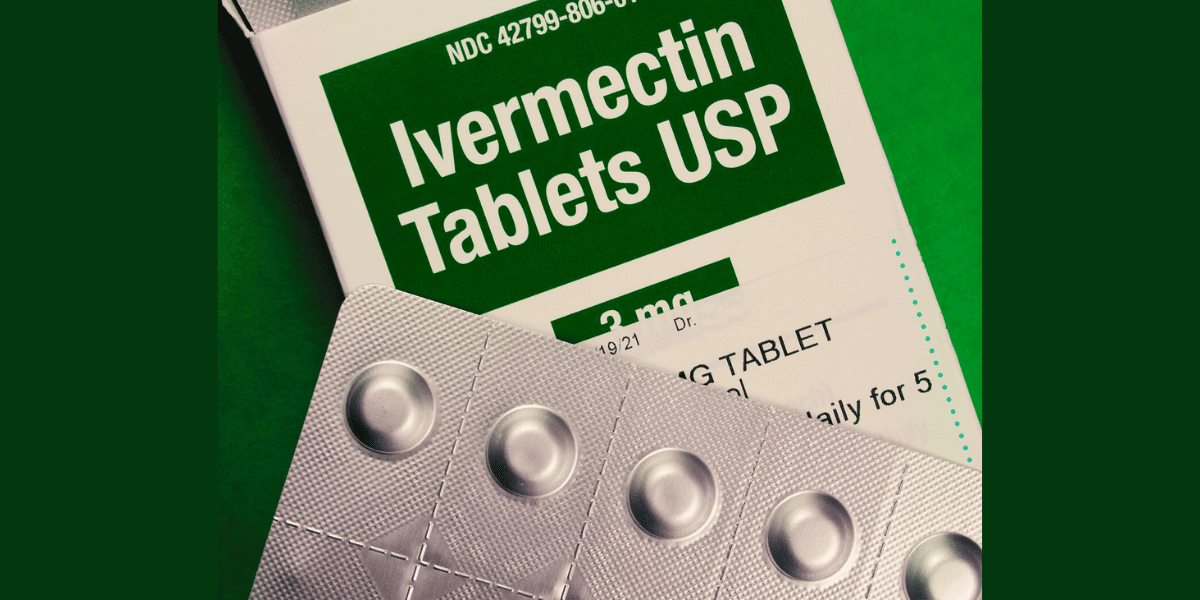EDITOR’S SUMMARY: Within the medical freedom community, there is judgment. It’s no wonder, as personal bias pushed onto other people is a tendency of the human race. To step out of this vicious cycle, you must catch the behavior in yourself, and do the work to retrain your mind. In regards to taking ivermectin, “you do you, and I’ll do me,” is a motto to live by, as is ”keep your eyes on your own page.” How small must your circles get before you’re willing to halt your opinions, and allow others the dignity to make their own choices?
By Jennifer Wolff-Gillispie HWP, LC
Since 2020, despite reports of doctors successfully using ivermectin to treat COVID-19, including testimony to the Homeland Security Committee, the smear campaign against it took off. Do you remember the numerous posts plastered on media sites slamming ivermectin for being “horse paste,” and making a mockery of anyone who dared even mention its use against COVID-19? Even the U.S. Food and Drug Administration (FDA) jumped onboard by taking a strong stance against it despite having approved it in 1996.
Dr. Peter McCullough is a leading cardiologist, previous vice chief of medicine at Baylor University Medical Center, and principal faculty in internal medicine for the Texas A&M University Health Science Center. He has been published over 1000 times, and cited in the National Library of Medicine over 500 times. He responded to the ivermectin backlash:
“And so for the U.S. FDA, the NIH, and then on one evening, virtually every single talk show host in the United States to refer to ivermectin as horse paste. That’s actually what my co-author John Lee calls ‘crude propaganda.’ That is very intentional, crude propaganda. The message is coming from some office…
Patients are seeking life-saving treatment, and they can be confused that it’s only a veterinary product. So this intentional propaganda and misinformation, I think it’s going to come at a heavy cost for those who’ve ever said those words.”
In 1928, Edward Bernays wrote the first book that disclosed how businesses and governments would use propaganda to manipulate personal and collective opinion. He stated:
“Those who manipulate this unseen mechanism of society constitute an invisible government which is the true ruling power of our country.”
The Unfolding
Propaganda or not, there was definitely a strong push across the media to discredit ivermectin. Did they forget that only 6 years earlier, in 2015, the Nobel Prize for Physiology or Medicine was jointly awarded to Japanese scientists, Satoshi Omura and William Campbell, for their roles in discovering avermectin (from which ivermectin is derived) to treat humans?
This naturally-occurring byproduct of the fermentation process of Streptomyces avermitilis (a gram positive bacteria) was found to be a safe, powerful, and effective antiparasitic, and eventually refined into the drug, ivermectin, that would be used by hundreds of millions of people across the globe to treat parasitic infections.
During his research in the 1960s and ‘70s, Omura was primarily focused on discovering and isolating naturally-occurring compounds from organisms, more specifically, from bacteria and fungus that were living in soil. Once he had successfully cultured new strains of Streptomyces (from soil bacteria), he sent it to researchers at Merck Research Laboratories in the U.S. There, parasitologist William Campbell (along with colleagues) took the sample and was able to distinguish a new family of compounds called avermectins.
This discovery led to Merck’s development of Mectizan (ivermectin), which was first used as a powerful treatment for river blindness (onchocerciasis)—a parasitic worm Onchocerca volvulus infection spread through the bite from infected blackflies (genus Simulium).
According to the Merck website:
“Through our Mectizan Donation Program (started in 1987) we have been working with partners for nearly three decades to make this medicine available, free of charge, to all those affected by river blindness.”
As of 2015, the Mectizan Donation Program has been the longest running disease-specific drug donation program to-date, and was expanded in 1988 to include the treatment of lymphatic filariasis, commonly known as elephantiasis. The program is estimated to have reached more than 250 million affected people, with over two billion treatments donated.
Its Versatility
In the 1980s, ivermectin was hailed as a “wonder drug” because of its ability to safely treat humans and animals suffering from parasitic infections. A paper published in 2011 on the National Institutes of Health (NIH) website, “Ivermectin, ‘Wonder drug’ from Japan: the human use perspective” asserts:
“There are few drugs that can seriously lay claim to the title of ‘Wonder drug’, penicillin and aspirin being two that have perhaps had greatest beneficial impact on the health and wellbeing of Mankind. But ivermectin can also be considered alongside those worthy contenders, based on its versatility, safety and the beneficial impact that it has had, and continues to have, worldwide…”
Up until the discovery of ivermectin, diethylcarbamazine and suramin (two potentially toxic medications) were the primary medications administered for river blindness and lymphatic filariasis. With lengthy treatment time and the need for Suramin to be delivered intravenously (IV), these options were nearly impossible for most of the afflicted to obtain. Ivermectin was a better, safer, and more accessible remedy.
In the September 2014 issue of Trends in Parasitology, Satoshi Omura and Andy Crump were quoted in the article “Ivermectin: panacea for resource-poor communities?” They emphasized ivermectin’s near limitless application possibilities:
“The tremendous and varied potential of ivermectin MDA (mass drug administration) was recognised by global public health experts 10 years ago when they labeled it an ‘underutilized public health strategy’ and called for the world to ‘capitalize on the full public health potential of ivermectin’ [1]. We wish to re-emphasise that clarion call and to encourage robust examination of the full scope and promise that the avermectins may still have to offer.”
And examine they did. Since the first doses of ivermectin were administered over 40 years ago, scientists and researchers have been looking into the multitude of ways it could be repurposed to treat other maladies. After the discovery of penicillin (antibiotic) in 1928, over 20,000 antibiotics have been discovered with approximately 600 of them also showing antiparasitic qualities. Additionally, antifungal, antiviral, anticancer, herbicidal, and insecticidal properties were documented.
With ivermectin having proven antiparasitic effects, it was natural for researchers to begin looking into its potential antibacterial, antifungal, antiviral, and anticancer applications.
Traditionally when you consider cancer treatment, an antiparasitic drug is not what comes to mind. Some cancer researchers, however, have found that ivermectin may actually hold loads of promise. Numerous studies have shown that ivermectin can be used to treat ovarian, breast, lung, colorectal, leukemia, and other cancers.
There are at least three ways that have been documented showing ivermectin works to inhibit cancer proliferation (growth). It can also be used in synergy with the chemotherapy agents, cytarabine and daunorubicin, to induce apoptosis (cell death) in leukemia cells. The following quote from PubMed Central, “Ivermectin, a potential anticancer drug derived from an antiparasitic drug,” asserts how and why ivermectin is a strong candidate for treating a multitude of cancers:
“Ivermectin has powerful antitumor effects, including the inhibition of proliferation, metastasis, and angiogenic activity, in a variety of cancer cells. This may be related to the regulation of multiple signaling pathways by ivermectin through PAK1 kinase. On the other hand, ivermectin promotes programmed cancer cell death, including apoptosis, autophagy and pyroptosis. Ivermectin induces apoptosis and autophagy is mutually regulated. Interestingly, ivermectin can also inhibit tumor stem cells and reverse multidrug resistance and exerts the optimal effect when used in combination with other chemotherapy drugs.”
Another reason ivermectin may work to treat cancer is because parasitic infections (including viruses, bacteria, fungi and worms) in the body can be the cause of many cancers. A visit to the National Library of Medicine confirms, “Viruses are obligate intracellular parasites,” so the application of ivermectin to treat any of the above infections would not be a stretch medically or scientifically.
More research however, especially in the United States, is needed to substantiate this treatment. To date, the National Cancer Institute (a branch of National Institutes of Health (NIH), has conducted or has slated to conduct zero clinical studies on ivermectin’s use against cancer. You can search for this yourself.
April 15, 2020: One month after the COVID-19 lockdown began, doctors and researchers were desperately looking for a safe and effective treatment for this novel virus, and there seemed to be hope almost immediately.
From “Study Shows Anti-Parasitic Drug Can Kill COVID-19 Virus in Cell Culture”:
“A study led by researchers at Monash University has found that the widely available anti-parasitic drug ivermectin is capable of killing the coronavirus disease 2019 (COVID-19) within 48 hours in a cell culture.
Although the finding is promising, the researchers cautioned that the tests conducted were in vitro and that trials need to be carried out in humans.”
‘“Ivermectin is very widely used and seen as a safe drug,” said Kylie Wagstaff, PhD, leader of the study, in a statement. “We need to figure out now whether the dosage you can use it at in humans will be effective—that’s the next step.”’
Ivermectin is an FDA-approved anti-parasitic drug, which has also shown efficacy in vitro against viruses such as HIV, and the Dengue, influenza, and Zika viruses.
‘“We found that even a single dose could essentially remove all viral RNA by 48 hours and that even at 24 hours there was a really significant reduction in it,”’ Wagstaff said.”
Despite this promising announcement early in the pandemic, the ability to acquire ivermectin as a potential treatment from a U.S. doctor was extremely challenging. Off-label use of medications are legal, and commonplace in the medical community, but pharmaceutical companies cannot promote them.
“While off‐label prescribing is widespread and completely legal, it is illegal for a pharmaceutical company to promote that use. If Merck said something as innocuous as suggesting that some clinical data favored ivermectin use against COVID, the drugmaker would set itself up for substantial penalties. During a particularly vigorous two‐year period, the Justice Department collected over $6 billion from drug companies for off‐label promotion cases. Merck’s lawyers haven’t forgotten that lesson.”

The Barriers
So why, you might ask, would the use of a widely administered, safe medication not be turned to by doctors and hospitals, especially in light of the promising research against viruses (including COVID-19)? It may have something to do with how EUA (Emergency Use Authorization) is granted.
Stated from “Ivermectin Could Have Saved Millions of Lives, Why Was It Suppressed,” by authors Richard Gale and Dr. Gary Null:
“In 2004, the US Congress passed an amendment to the Federal Food, Drug and Cosmetic Act known as Emergency Use Authorization (EUA). This piece of legislature legalized an anti-regulatory pathway to allow experimental medical interventions to be expedited without proper safety evaluation in the event of bioterrorist threats and national health emergencies such as pandemics.
At the time, passage of the EUA amendment made sense because it was partially in response to the 2001 anthrax attacks and the US’s entry into an age of international terrorism. However, the amendment raises some serious considerations. Before the Covid-19 pandemic, EUAs had only been authorized on four occasions: the 2005 avian H5N1 and 2009 H1N1 swine flu, the 2014 Ebola and the 2016 Zikra viruses.”
In order for the U.S. government to permit an EUA, and employ the use of an experimental diagnostic, drug, or vaccine, several requirements must first be fulfilled:
- The U.S. Secretary of Health and Human Services (HHS) must have adequate proof that the country is experiencing a life-threatening emergency.
- The product, drug, or vaccine being considered must have abundant scientific proof that it will actually be effective against the medical threat.
- Even though the product, drug, or vaccine does not have to engage in stringent evaluation by the U.S. Food and Drug Administration (FDA), it must show (at minimum) that its potential and recognized benefits outweigh its possible and known risks.
- The product, drug, or vaccine must be manufactured in total conformity with customary quality control and safety measures.
- Products with EUA must give informed consent; every person given the product must have prior knowledge of its experimental status and the potential risks and benefits.
- EUA’s will not be granted for any intervention or product if an FDA approved product that can treat the condition already exists.
So to answer the question posed earlier, the use of ivermectin to treat COVID-19 during the pandemic would have disqualified the vaccines from having Emergency Use Authorization, and they would have needed to go through the normal procedures to achieve FDA approval, which can take over 10 years to achieve.
Since Merck’s patent for ivermectin expired in 1988, other companies have been able to produce a generic version of the drug which “watered down” the potential profit for the pharmaceutical giant. Turning to vaccines and new patentable drugs and therapies would turn out to be a much more lucrative financial move. With an estimated annual profit of over $12 billion dollars in vaccine sales, it’s not hard to see why pharma was eager for EUA approval.
Additionally, the average cost according to Kaiser Permanente to treat a patient with COVID-19 has been between $9,723–$20,292 (depending on severity). For those on Medicare, admission to the hospital would run $13,000, and being placed on a ventilator … a whopping $39,000. Attorney Tom Renz has estimated the total amount a hospital received for a COVID-19 patient was over $100,000, allowing hospitals and doctors to cash in as well.

Freedom to Choose
Since 2020, ivermectin has been used to successfully treat COVID-19 in 28% of the world’s population. However, obtaining this treatment in the U.S. was almost nonexistent. In a move to take back the power, and allow individuals to make their own healthcare decisions, Tennessee passed a bill (SB 2188) on April 6, 2022, allowing ivermectin for human use to be sold and purchased over-the-counter, without a prescription or consultation with a pharmacist.
In May 2022, New Hampshire also passed a bill (HB1022) allowing pharmacists to sell ivermectin without a prescription, but the bill was quickly vetoed by Governor Sununu in June. This perpetuated the wedge between consenting adults, and an FDA-approved treatment.
On August 11, 2023, Charlie Kirk, activist, and radio talk show host, took to X (Twitter) to call out the FDA for changing its position when under legal scrutiny:
“The FDA has now endorsed treating COVID with Ivermectin! The FDA has blood on its hands. How many Americans senselessly died because Big Medicine called this cheap, readily available Nobel Prize winning medicine horse paste?”
Over the course of the last three years, the headlines coming from the FDA have continuously left the impression that ivermectin was dangerous, and ineffective for the treatment of COVID-19, while research, and anecdotal evidence proved otherwise. To “protect” yourself, they suggested the “best course of action” was to take the highly-touted vaccines and boosters, despite ever-increasing reports of their dangers.
When ivermectin is taken at the proper dosage, it is generally safe. However, it is a semisynthetic pharmaceutical that can cause muscle and joint pain, dizziness, and swelling in the body. On rare occasions it can cause vomiting or seizures. While these are isolated cases, you may determine for yourself that the risks are not worth the reward. In this case, opt for natural remedies such as medicinal mushrooms, herbs, vitamins, and minerals to treat a viral infection, including COVID-19.
Regardless of the path you choose, what’s most important is retaining your right to explore the option that is best for you. If you are working through health issues with a physician or practitioner, the doctor-patient relationship should never be violated or infringed upon.
Fortunately perhaps, truth (and justice) cannot be evaded forever. Attorney Jered Kelson, represented three doctors—Marik, Bowden and Apter—in their lawsuit against the FDA. Arguing the FDA “acted outside of its authority” in regards to their position on ivermectin and COVID-19, he summed up the situation:
“After the FDA approves the human drug for sale, does it then have the authority to interfere with how that drug is used within the doctor-patient relationship? The answer is no.”
~
Published on November 09, 2023.
To contact A Voice For Choice Advocacy, please email media@avoiceforchoice.org.
If you would like to support the research and health education of AVFC editorial, please consider making a donation today. Thank you.

